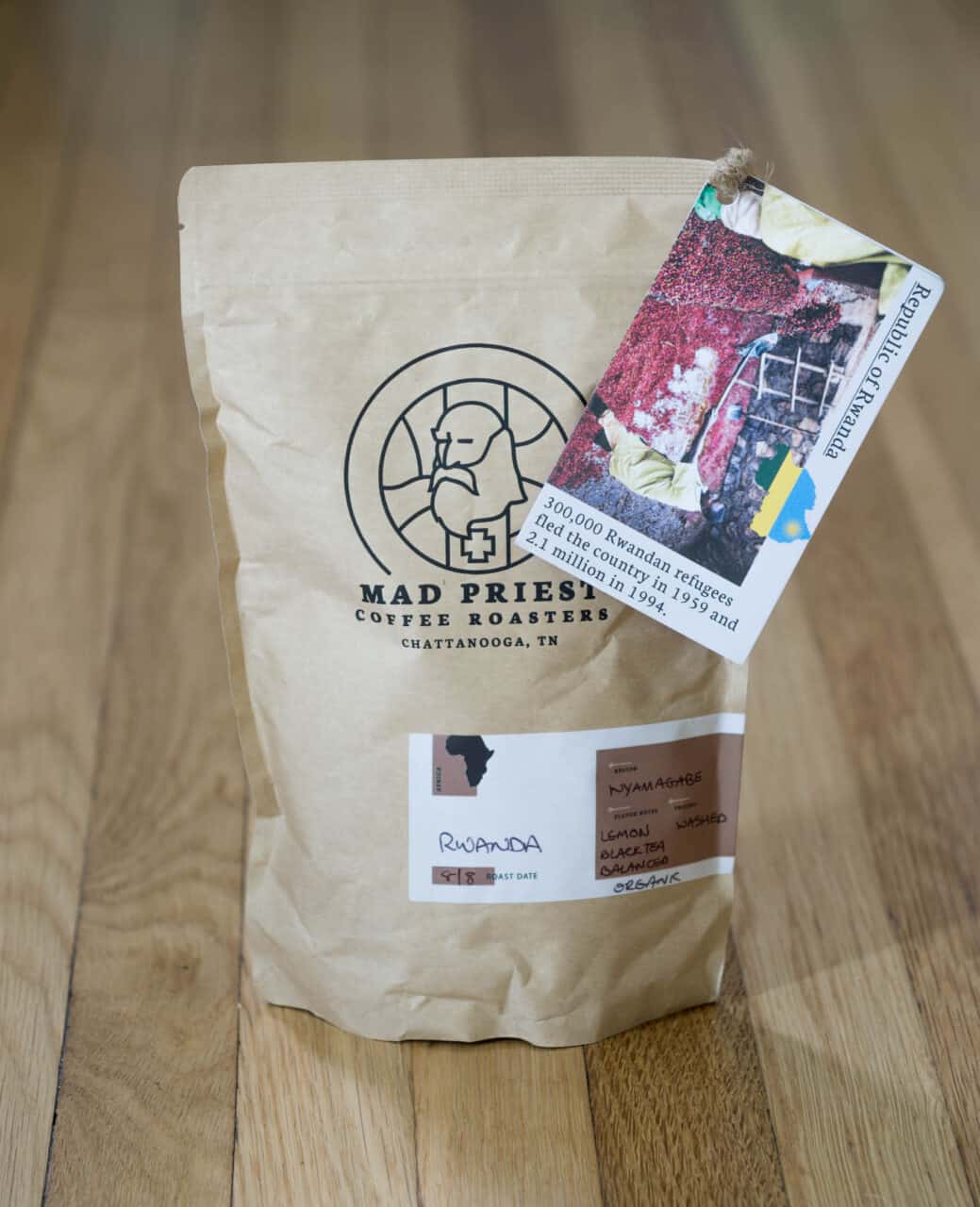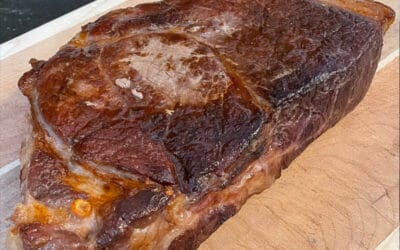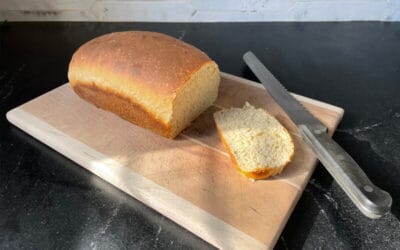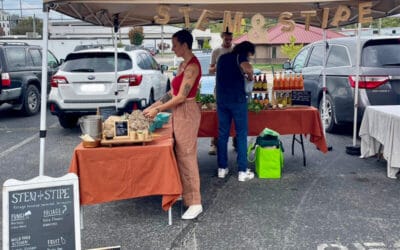This week I’m sharing a recipe from Michael Rice of Mad Priest Coffee Roasters. Each month or so Michael features one of his coffees and the country it’s from, along with a recipe from that country. Mad Priest’s mission is to “craft good coffee, educate the curious, and champion the displaced”. The coffee/country/recipe combination is one of the ways they are doing that. This month’s country is Rwanda, the coffee is Bourbon from the Nyamagabe region, and the recipe is for Igisafuliya (Rwandan chicken stew). Although the recipe contains some exotic ingredients, they are available locally and most of the ingredients are found at the market as well.
The Rwanda coffee is my favorite so far from Mad Priest. The flavor notes listed are lemon, black tea, and balanced. I was surprised to see the lemon as my first thought drinking it was “chocolate!” Note that I eat unsweetened or lightly sweetened chocolate so I was not detecting a sweet taste. I think what I was experiencing was the balanced part of the flavor, an effect of a washed coffee such as this one – if I’m understanding this correctly. I’m no expert! In subsequent cups I began to notice the various subtle flavors that contribute to its complexity.
From Mad Priest about the featured coffee:
This coffee comes from Buf Cafe and is 100% Bourbon variety. The famed Buf Cafe washing station is in the mountains near the village of Karaba, in the Ginkongoro prefecture in south-central Rwanda. Buf Cafe started operation in 2000, after funding aid from the Rwandan Development Bank and USAID’s PEARL project.
About Rwanda:
In the 1930s, the Belgian colonial empire forced Rwandan farmers to plant masses of low-quality coffee. But the coffee industry was virtually wiped out after the horrific 1994 genocide (around 800,000 people were killed in 100 days), which was the culmination of a century of hostility and conflict between the Hutu and Tutsi ethnic groups. In 1959, the Hutu revolution caused 300,000 Tutsi refugees to flee the country. But larger by far was the African Great Lakes refugee crisis after the genocide, which caused 2.1 million refugees (mostly Hutus) to flee to neighboring countries in 1994 (200,000+ fled to Tanzania on April 28 alone). The horrors continued in refugee camps where 50,000 people died of cholera and other diseases and the exiled Hutu military leaders took control of the camps, eventually leading to the First Congo War in 1996.
But slowly Rwanda is rebuilding, and some leaders recognized the potential of the coffee industry to re-write the future of the country. And in spite of the destruction of war, this “land of a thousand hills” has excellent coffee growing conditions: high altitude, volcanic soil, plenty of sun, and equatorial mist. Today the coffee industry has been responsible for creating jobs, boosting the farmers’ quality of life, and even helping in the reconciliation process between the Hutus and Tutsis, all while delivering some of the finest coffee to the world.
About the recipe:
Traditional Rwandan food includes lots of potatoes, beans, cassava, plantains, vegetables, and fruit, with occasional meat. Igisafuliya, which means “one pot” in Kinyarwanda, is a combination of some of these flavors in a mellow sauce. As the Rwandan proverb says, “The most extensive land is the human belly.” Enjoy!
Notes from Heather:
Ingredients in this recipe likely found at the market this week are chicken, onions, leeks, tomatoes, bell peppers, spinach, and chili peppers. Occasionally some farmers have celery, too. The only exotic ingredient is plantain, but those are found at most grocery stores in the area. You’ll want green plantains as this is a savory dish. Green plantains can be a bother to peel but I’ve found soaking them in hot water for a while first helps the process.
Igisafuliya (Rwandan Chicken Stew)
From 196 Flavors
WHAT YOU NEED:
4 chicken thighs
2 onions, chopped
4 green bell peppers, seeded and chopped
4 tomatoes, peeled and seeded, cut
The chopped leaves of a bunch of celery
4 plantains, peeled and cut in half lengthwise, then in half width
1 cup spinach, fresh or frozen
3 tablespoons tomato paste
4 tablespoons oil
1 chili pepper (optional)
Salt and pepper to taste
WHAT YOU DO:
In a large pot, sauté the chicken over medium-high heat in hot oil to brown all sides. Add the onion and bell peppers and cook for 10 minutes, stirring occasionally.
Then add tomatoes, celery and tomato paste and mix well. Cook over medium heat for 15 minutes, stirring regularly. Cover with water, add salt and pepper and bring to a boil, then reduce heat and simmer for about 15 minutes.
Remove two pieces of chicken, place plantains, cover with spinach, then put the pieces of chicken on top. Add water if necessary so that plantains are completely immersed.
Cover, add the chili pepper, and simmer over low heat for about 25 minutes.
Photos of the finished dish here
Printable recipe here
Other Info:
Brief history of coffee/country–example of blog post on a roasters website
https://www.theroasterie.com/blog/how-coffee-rebuilt-the-country-of-rwanda/
NPR interview with african journalist about coffee
http://www.npr.org/sections/thesalt/2012/08/16/158940463/rwandan-coffee-farmers-turn-premium-beans-into-harvest-gold
Brief history/current farm review–story of Epiphanie Muhirwa
https://www.perfectdailygrind.com/2015/04/drop-coffee-epiphanie-muhirwa/
In depth history/stories/coffee
http://www.nytimes.com/2006/08/06/business/yourmoney/06coffee.html
Timeline of rwanda
http://www.bbc.com/news/world-africa-14093322
More history/genocide
http://www.history.com/topics/rwandan-genocide
More specific timeline of war years
http://www.pbs.org/wgbh/pages/frontline/shows/rwanda/etc/cron.html
Refugees returning finally in 2016
http://www.unhcr.org/en-us/news/stories/2016/8/57bad29d4/rwandan-refugees-head-home-generation-angola.html
Great lakes refugee crisis
http://www.unhcr.org/en-us/publications/refugeemag/3b6925384/refugees-magazine-issue-110-crisis-great-lakes-cover-story-heart-darkness.html
Quotes from journalists during crisis
http://www.rwandanstories.org/genocide/refugee_crisis.html





0 Comments